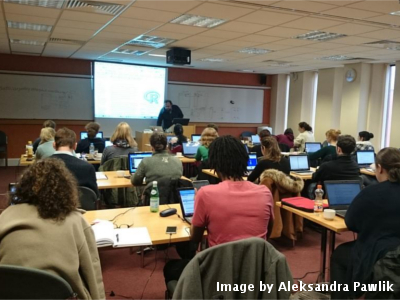Observations from the first UK Data Carpentry workshop
Posted on 9 December 2014
Observations from the first UK Data Carpentry workshop
 By Ian Dunlop, Software Engineer, University of Manchester
By Ian Dunlop, Software Engineer, University of Manchester
Last week I had the good fortune be a helper at the first Data Carpentry workshop run at the University of Manchester.
The workshop was supported by ELIXIR UK. The instructors were Alejandra Gonzalez-Beltran from the Oxford e-Research Centre (OeRC), as well as the Institute's Shoaib Sufi and Aleksandra Pawlik.
The workshop's helpers were Aleksandra Nenadic, Christian Brenninkmeijer and myself, all based at the University of Manchester. Here are some thoughts on it all.
Firstly, people are not dumb but their Operating Systems make them do dumb things. One of the students had an issue with R Studio where it could not find a version of R on their laptop. This confused them because they could see the icon on their desktop and it worked well enough when they double clicked on it.
What they hadn't realised was that their OS let them install it in their Documents folder rather than Program Files where R Studio expected it to be. Surely operating systems have a mechanism to discover other applications by now?
Secondly, file systems remain complex and confusing. GUI tools, like the File Explorer, abstract and hide the true nature of what is on your laptop's hard disk. We are now in an age where users are not as close to their computers as they were in late 90s due to modern operating systems concealing more and more of their operations behind their interfaces. In the 1980s, most PCs used DOS which required you to navigate using a keyboard and made you intimately aware of exactly where files were on your computer. Nowadays most people have never even seen a terminal and are not aware that the file structure presented by a UI isn't an accurate reflection of how files are really organised.
Thirdly, it's always better to be concrete than abstract. People like examples. They especially like examples which they can understand in relation to their day to day experiences, such as spreadsheets. Abstract concepts are best learned through practical examples.
For all this, after two days of Spreadsheets, SQL & R, I left with high hopes for the future. People want to learn these tools. They have a real thirst for more. The future will be full of Data Carpenters. Time to grab your tools.
